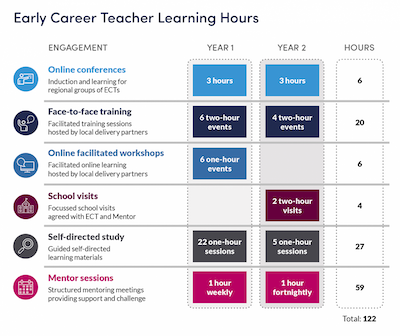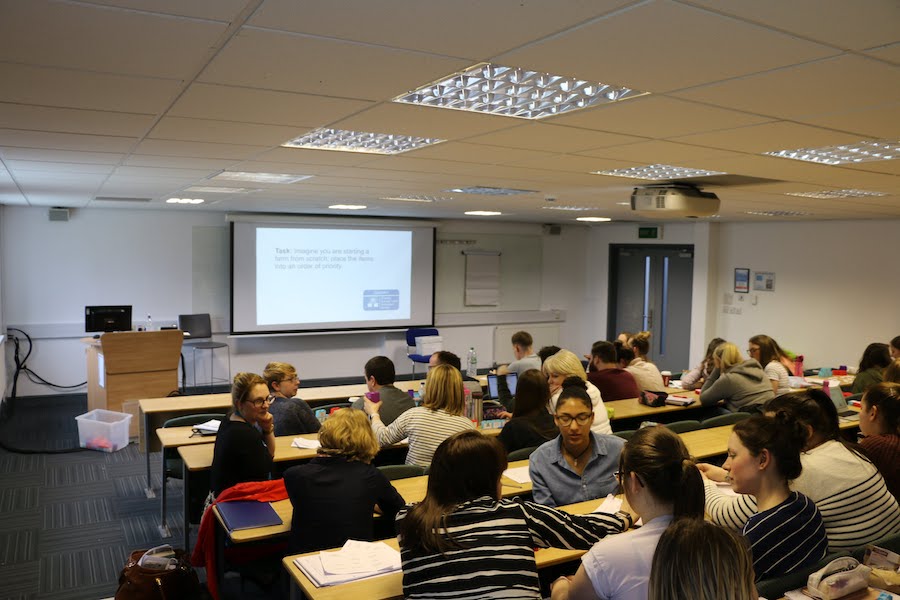The Early Career Framework (ECF): A Guide for New Teachers
Understand the Early Career Framework and what it means for new teachers. Learn about the two-year induction programme, mentoring, and professional development expectations.


The Early Career Framework (ECF) is more than just a training program; it's a transformative journey that shapes the future of the teaching profession. Spanning over a 2-year period, the ECF is a meticulously designed early roll-out programme that offers fully funded, high-quality training and support, all anchored in advanced research evidence.
This initiative ensures that new educators are not only prepared for the realities of working in a school setting but are also given dedicated time to immerse themselves in professional development.
The ECF's delivery partners, who bear regional responsibilities, collaborate with induction mentors to create a robust induction process. Together, they lay down the bedrock of knowledge and skills essential for independent classroom functioning.
The core induction programme is not just about formal assessment or behaviour management; it's about understanding the very essence of quality pedagogy. With one day a week dedicated to face-to-face training with skilled professionals, participants delve into the nuances of the teaching profession, exploring everything from Professional behaviours to teacher workload management.
Adherence to the ITT Core Content Framework is non-negotiable, ensuring a comprehensive coverage of teaching theory and practice.
Dr. Emily Thompson, an expert in educational development, states, "The ECF is a beacon of innovation, setting new standards in online training and in-person guidance, nurturing educators to thrive in their roles." According to a recent statistic, over 90% of participants in the ECF program reported significant improvements in their teaching skills.
Key Insights and Important Facts:
In 2019, the Teacher Recruitment and Retention Strategy was published by the Department for Education (DfE), which highlighted the adverse impact and major problems in education, specifically relating to the challenges in teacher retention. It was noticed that the main reason for teacher shortages was the lack of support at the start of teaching career. To provide sufficient support to the early career teachers, a reform was introduced for teacher development – the Early Career Framework (ECF).
The Early Career Framework (ECF) describes the skills and knowledge for the early career teachers, and it has been utilised for creating the 2-Year programme of training and development. This programme is aimed at providing the right support to lay the foundation of a successful and rewarding career in teaching.

Teachers need to be prepared with professional knowledge in the classroom. The early career framework provides teachers with evidence-informed ideas that are deemed important for classroom practice. As well as addressing curriculum knowledge, the framework also addresses pedagogical challenges that educators will inevitably face. As well as exploring concepts such as curriculum structure and design, participants will also develop skills in areas such as:
1) Scaffolding
4) Practice, challenge and success
7) Structured support for learning
8) Instructions
Depending on the school context, participants will focus on these given areas with different priorities. It might be that the training materials are particularly focused upon special educational needs if there are a significant amount of special schools within the cluster. The training sessions could also be centred around quality pupil learning in secondary schools if the School hub has fewer primary schools.
Regardless of the school context, induction activities should prepare student teachers with the pedagogical strategies they need to excel in the classroom environment. Many of the principles included in the ECT induction have universal application across all school phases.

Early career framework is advantageous because it provides essential knowledge about different aspects of classroom practice and career progression opportunities for early career teachers. The early career teachers can get easy access to:

An early career framework is advantageous for the schools as they can benefit from:

Every early career teacher, previously called newly qualified teacher (NQT), across each subject and phase at a state-funded school, is entitled to the ECF programme.
From September 2021, it has been made mandatory for every school to enrol each early career teacher (ECT) for the structured Two-Year Package of Early Career Framework programme.
The 2-year ECF Roll-out programme was initiated in September 2020 for the selected school partners in Greater Manchester, North-East, Doncaster and Bradford.
Due to the coronavirus pandemic, the 2-year ECF Roll-out programme was widened to 4,600 new educators other than early roll-out areas, who earned a 1-year package of support-based on the ECF. Those who started their ECF programmes will proceed as planned until their completion and wouldn't be affected by the launch of the new ECF national roll-out.

As part of the ECF reforms, statutory induction for new teachers was changed in September 2021. According to the new reforms, each early career teacher on statutory induction will be eligible for a structured 2-year package of high-quality professional development support based on the ECF.
Every school needs to replace its induction programme. The schools can benefit from a range of support available to ensure that they meet the statute, including an updated DfE funded provider-led programme of training and support.
Revised statutory induction guidance discusses the responsibilities of mentors, induction tutors, middle leader and career leader, to help early career teachers undertake statutory core induction programme.
Major changes are:

Schools can choose from the following 3 approaches to enable the delivery of an ECF-based induction.
School leaders can decide the most suitable approach after ensuring that their selected approach to induction will best suit their early career teachers and mentors.

Those who choose to create and deliver their 2-year induction programme, using DfE- accredited materials and training, for early career teachers and their mentors on basis of the ECF must know that the DfE will provide funding for the time off timetable for the mentors and early career teachers; schools will be paid directly in the second year of induction.
These schools are expected to develop a 2-year programme of support and training including every ‘learn how to’ and ‘learn that’ practice statements in the ECF. Also, they must provide evidence to their appropriate body to ascertain their induction programme meets statutory requirements and is ECF-based. These schools need to get in touch with their appropriate body for additional details of what body of evidence will be needed in the summer term. Schools that will create and deliver their individual ECF-based induction wouldn't use DfE’s online resources to run their induction.
It is expected that the early career framework reforms will bring a significant change and support early career teachers, through a funded, provider-led programme entitlement to professional development. The early career framework is part of the teacher recruitment and retention strategy of the local government, which aims to provide initial teacher training and development opportunities to early career teachers. The early career framework sets out what exactly an early career teacher must know, and learn the best ways of teaching, in their first 2 years of teaching careers. Before September 2021, every school was expected to:
The Early Career Framework (ECF) is more than just a training program; it's a transformative journey that shapes the future of the teaching profession. Spanning over a 2-year period, the ECF is a meticulously designed early roll-out programme that offers fully funded, high-quality training and support, all anchored in advanced research evidence.
This initiative ensures that new educators are not only prepared for the realities of working in a school setting but are also given dedicated time to immerse themselves in professional development.
The ECF's delivery partners, who bear regional responsibilities, collaborate with induction mentors to create a robust induction process. Together, they lay down the bedrock of knowledge and skills essential for independent classroom functioning.
The core induction programme is not just about formal assessment or behaviour management; it's about understanding the very essence of quality pedagogy. With one day a week dedicated to face-to-face training with skilled professionals, participants delve into the nuances of the teaching profession, exploring everything from Professional behaviours to teacher workload management.
Adherence to the ITT Core Content Framework is non-negotiable, ensuring a comprehensive coverage of teaching theory and practice.
Dr. Emily Thompson, an expert in educational development, states, "The ECF is a beacon of innovation, setting new standards in online training and in-person guidance, nurturing educators to thrive in their roles." According to a recent statistic, over 90% of participants in the ECF program reported significant improvements in their teaching skills.
Key Insights and Important Facts:
In 2019, the Teacher Recruitment and Retention Strategy was published by the Department for Education (DfE), which highlighted the adverse impact and major problems in education, specifically relating to the challenges in teacher retention. It was noticed that the main reason for teacher shortages was the lack of support at the start of teaching career. To provide sufficient support to the early career teachers, a reform was introduced for teacher development – the Early Career Framework (ECF).
The Early Career Framework (ECF) describes the skills and knowledge for the early career teachers, and it has been utilised for creating the 2-Year programme of training and development. This programme is aimed at providing the right support to lay the foundation of a successful and rewarding career in teaching.

Teachers need to be prepared with professional knowledge in the classroom. The early career framework provides teachers with evidence-informed ideas that are deemed important for classroom practice. As well as addressing curriculum knowledge, the framework also addresses pedagogical challenges that educators will inevitably face. As well as exploring concepts such as curriculum structure and design, participants will also develop skills in areas such as:
1) Scaffolding
4) Practice, challenge and success
7) Structured support for learning
8) Instructions
Depending on the school context, participants will focus on these given areas with different priorities. It might be that the training materials are particularly focused upon special educational needs if there are a significant amount of special schools within the cluster. The training sessions could also be centred around quality pupil learning in secondary schools if the School hub has fewer primary schools.
Regardless of the school context, induction activities should prepare student teachers with the pedagogical strategies they need to excel in the classroom environment. Many of the principles included in the ECT induction have universal application across all school phases.

Early career framework is advantageous because it provides essential knowledge about different aspects of classroom practice and career progression opportunities for early career teachers. The early career teachers can get easy access to:

An early career framework is advantageous for the schools as they can benefit from:

Every early career teacher, previously called newly qualified teacher (NQT), across each subject and phase at a state-funded school, is entitled to the ECF programme.
From September 2021, it has been made mandatory for every school to enrol each early career teacher (ECT) for the structured Two-Year Package of Early Career Framework programme.
The 2-year ECF Roll-out programme was initiated in September 2020 for the selected school partners in Greater Manchester, North-East, Doncaster and Bradford.
Due to the coronavirus pandemic, the 2-year ECF Roll-out programme was widened to 4,600 new educators other than early roll-out areas, who earned a 1-year package of support-based on the ECF. Those who started their ECF programmes will proceed as planned until their completion and wouldn't be affected by the launch of the new ECF national roll-out.

As part of the ECF reforms, statutory induction for new teachers was changed in September 2021. According to the new reforms, each early career teacher on statutory induction will be eligible for a structured 2-year package of high-quality professional development support based on the ECF.
Every school needs to replace its induction programme. The schools can benefit from a range of support available to ensure that they meet the statute, including an updated DfE funded provider-led programme of training and support.
Revised statutory induction guidance discusses the responsibilities of mentors, induction tutors, middle leader and career leader, to help early career teachers undertake statutory core induction programme.
Major changes are:

Schools can choose from the following 3 approaches to enable the delivery of an ECF-based induction.
School leaders can decide the most suitable approach after ensuring that their selected approach to induction will best suit their early career teachers and mentors.

Those who choose to create and deliver their 2-year induction programme, using DfE- accredited materials and training, for early career teachers and their mentors on basis of the ECF must know that the DfE will provide funding for the time off timetable for the mentors and early career teachers; schools will be paid directly in the second year of induction.
These schools are expected to develop a 2-year programme of support and training including every ‘learn how to’ and ‘learn that’ practice statements in the ECF. Also, they must provide evidence to their appropriate body to ascertain their induction programme meets statutory requirements and is ECF-based. These schools need to get in touch with their appropriate body for additional details of what body of evidence will be needed in the summer term. Schools that will create and deliver their individual ECF-based induction wouldn't use DfE’s online resources to run their induction.
It is expected that the early career framework reforms will bring a significant change and support early career teachers, through a funded, provider-led programme entitlement to professional development. The early career framework is part of the teacher recruitment and retention strategy of the local government, which aims to provide initial teacher training and development opportunities to early career teachers. The early career framework sets out what exactly an early career teacher must know, and learn the best ways of teaching, in their first 2 years of teaching careers. Before September 2021, every school was expected to: